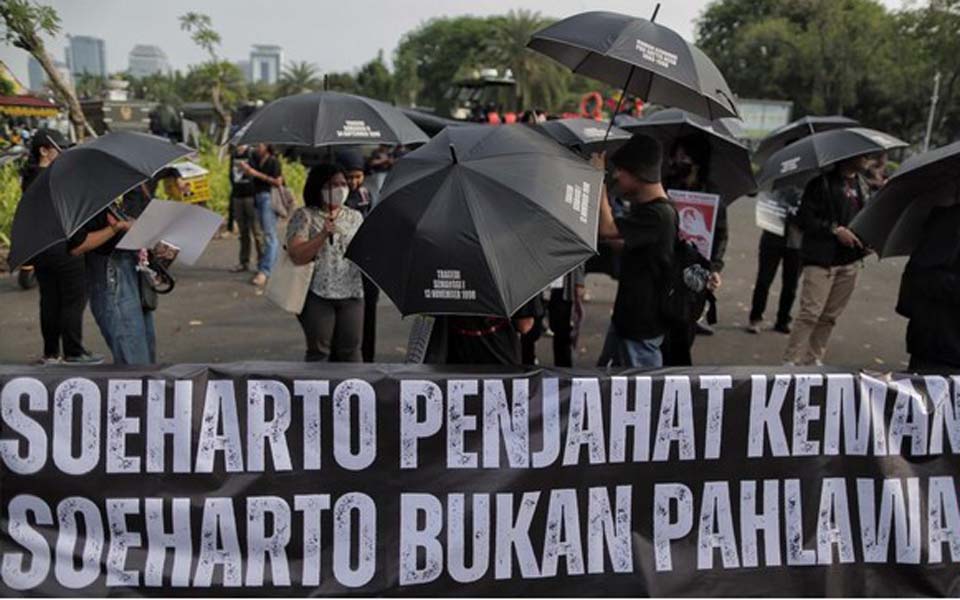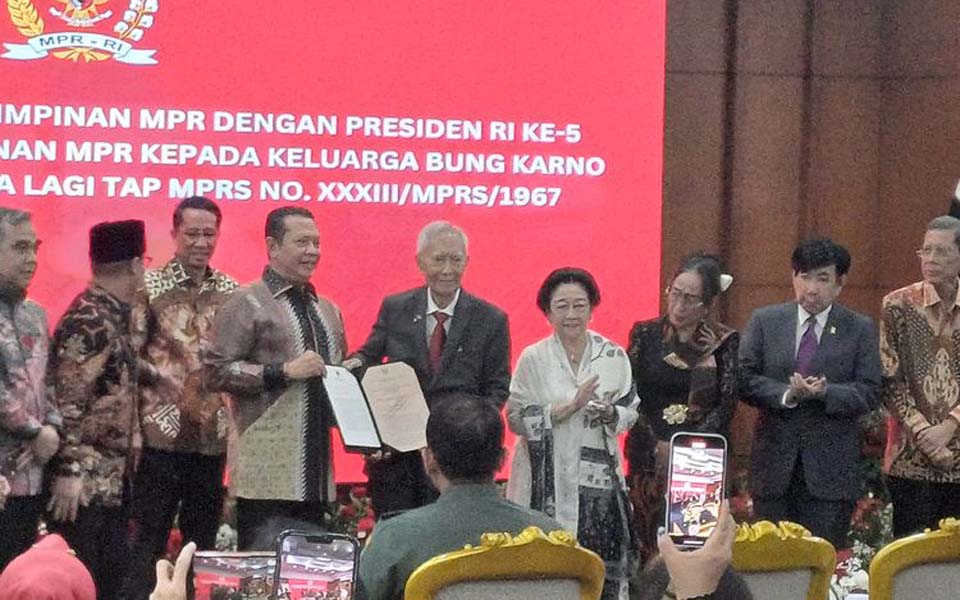Jakarta – Provisional People’s Consultative Assembly (MPRS) Decree Number XXV/1966 cannot in any way be the basis for Article 60 sub-section (g) of Law Number 12/2003 on the general elections. This is because the MPRS decree only specifies that the Indonesian Communist Party (PKI) is a banned organisation. The government must distinguish between involvement in the PKI and the September 30 Movement1 and the individual rights of ex-PKI members as Indonesian citizens.
“I make a distinction between two issues, firstly, to what extent was the PKI involved in G30S. If the party was involved as an organisation this should not become the responsibility of its members, with the exception of those members who were involved in the G30S affair”, explained Franz Magnis Suseno, a senior philosophy teacher from the Driyarkara School of Higher Philosophy in his testimony before the Constitutional Court on Wednesday February 18.
Suseno added that if the [New Order regime of former President Suharto’s] version of events which says that the PKI was involved in G30S is true, this does not mean that people who became members of the party can be deemed to be guilty, except if they are proven to have been involved in the preparations and execution of the G30S affair.
Suseno’s testimony contradicts the government’s argument which was presented by the minister of home affairs, Hari Sabarno, when he gave a testimony at the Constitutional Court in mid-January. (Kompas January 14).
On that occasion, Sabarno explained that the government was only implementing the MPRS decree which in the end was not abolished at the annual session the People’s Consultative Assembly. He explained that the government was simply taking a passive position. Because the MPRS decree was not abolished thus Article 60 sub-section (g) does not need to be removed [from the law on general elections].
Expert witness
Suseno was appearing as an expert witness in a judicial review by two plaintiffs, Deliar Noer and associates (as the first plaintiff) and the Struggle Institute for the Rehabilitation of Victims of the New Order Regime (Lembaga Perjuangan Rehabilitasi Korban Rezim Orde Baru, LPR-KROB) (as the second plaintiff).
The two plaintiffs are appealing to the Constitutional Court to conduct a judicial review of Article 60 sub-section (g) in the law on general elections which the two plaintiffs believe is a violation of the constitutional rights and entitlements of ex-PKI members.
Article 60 states that candidate members of the People’s Representative Assembly, the Regional Representative Council, the provincial Regional Legislative Council and the regency/city Regional Legislative Council must fulfil the requirements of sub-section (g) [which states that they must] “not be an ex-member of the banned organisation the Indonesian Communist Party, including it’s mass organisations, or be a person who was directly or indirectly involved in G30S/PKI2 or other banned organisations”.
Suseno gave the example of the German government’s soft treatment of the National Socialist Party who’s troops were known as Nazis. Certainly the German government banned the National Socialist Party and convicted Nazis who were involved in massacres and act of brutality. However the German government did not bring those party members who were not involved in such acts to trial. “Moreover, in Germany, a person who is an ex-Nazi member can vote and can be elected as a member of legislative [bodies]”.
Suseno explain that although there was a program of de-Nazism in 1945, when there was very harsh treatment of ex-Nazis, in 1949 this began to loosen up and by 1953 it had completely disappeared. “In Germany there has instead been criticism that ex-Nazis have tended to be treated too softly, not too harshly”, said Suseno.
Another witness, Thamrin Amal Tomagola, said that people’s attraction to Marxist or Communist teachings is because of the economic institutions which have created social disparity in society. The channeling of people’s economic, political and cultural desires has been blocked and has resulted in public disappointment.
Tomagola was appearing at the review as the second expert witness in has capacity as a sociologist. “Ideologies cannot be banned because they reside in people’s minds. If the government want’s to cut off this ideology, what should change is the conditions which cause public disappointment”, said Tomagola. (VIN)
Notes:
1. September 30 Movement (Gerakan 30 September, G30S) – An acronym referring to the alleged coup attempt in 1965 which the New Order regime of former President Suharto blamed on the Indonesian Communist Party. G30S was a grouping of middle-ranking officers lead by Lieutenant Colonel Untung, who kidnapped and killed six generals whom they accused of being members of a “Council of Generals” allegedly organising a coup against president Sukarno.
2. G30S/PKI – The was the original acronym used prior the overthrow of former President Suharto in 1998. Since then the involvement of the PKI in G30S has begun to be publicly questioned and the affair is now generally referred to only by the acronym G30S.
[Translated by James Balowski.]















